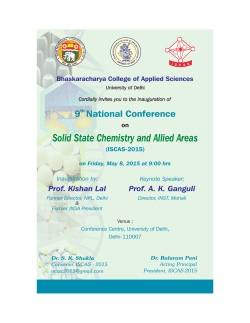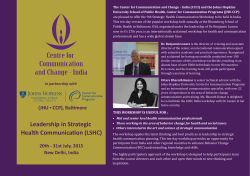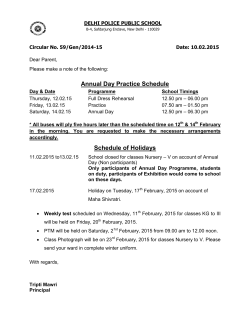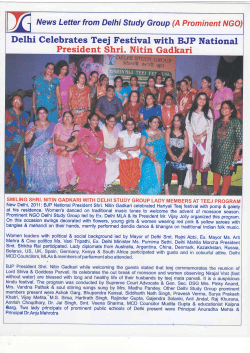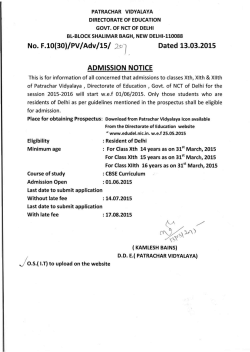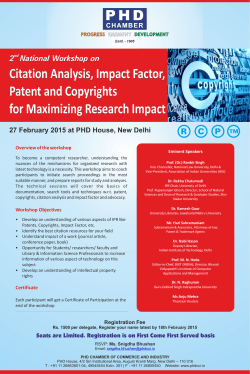
TEQIP-II sponsored faculty development programme on
Introduction The faculty development program is planned to impart one week training program for the academician, scientist and research scholars of engineering Institution/University/R & D laboratories who are working in the field of nonlinear control systems, soft computing techniques, optimization, evolutionary computing algorithm etc. Dynamical systems design is complex by nature, and becoming more complex day by day. A mathematical model, which captures the dynamical behavior of the system is developed and then soft computing techniques are applied to meet the required performance specifications. The most of the physical systems such as power plants, aircraft, spacecraft, chemical processes, robotic systems, and unmanned ballistic missiles are inherently non-linear dynamical systems. A nonlinear function approximation using nature inspired algorithms can be achieved quite successfully, design of a nonlinear controller using soft computing techniques has received a lot of attentions from researchers in the recent past. This course aims, a general introduction of nonlinear systems, nonlinear control design using genetic algorithm, bacterial foraging algorithm and other Bio-inspired algorithms. Course Contents 1. Introduction to single and multi-objective optimization 2. Genetic Algorithm Identification and Control of Nonlinear systems using GA Applications of Genetic Algorithm GA toolbox in MATLAB 3. Bacterial Foraging Algorithm Identification of nonlinear systems using Bacterial Foraging Algorithm Adaptive Control using BFA Simulation of BFA using MATLAB 4. Particle Swarm Optimization Optimization using Particle Swarm Optimization Applications of Particle Swarm Optimization Simulation of PSO using MATLAB. 5. Biography Based Optimization Optimization using BBO Applications of BBO 6. Other Bio-inspired Algorithms Ant Colony Optimization Simulated Annealing 7. Hybrid control using fuzzy and neural networks 8. Swarm Intelligence Resource Persons Experts from IITs/NITs and other reputed institutions, leading industries and R&D organizations will be invited to deliver expert lectures during program. Participants: The programme is open to the faculty members of AICTE/UGC approved Engineering Institutions/University/R&D Labs and persons from industries working in the area of nature inspired algorithms and their applications. Faculty Development Programme On Nature Inspired Algorithms & Their Applications (NIATA-2015) July 13-17, 2015 Sponsored by Technical Education Quality Improvement Program-II Patron Prof. Pradeep Kumar, Vice Chancellor, DTU Principal Coordinator Prof. Madhusudan Singh, Head, EED Accommodation and Travel The university has limited accommodations in the guest house, however, accommodation for few outside Delhi participants can be arranged in campus (guest house or hostel) on request. The delegates will have to bear the expenses. As per TEQIP-II guidelines, TA/DA of the participant will not be permitted. However, working lunch/tea will be served during the course. Registration: Registration form in the prescribed format should reach the Coordinator on or before 27th June 2015. To avoid administrative delay, the applicants may send an advance copy of the application form before the due date. The selection letter will be send through Email only on or before 1st July 2015. Course Coordinators Dr. Dheeraj Joshi Dr. Bharat Bhushan Mrs. Garima Organized by Department of Electrical Engineering Delhi Technological University (Formerly Delhi College of Engineering) Shahbad Daulatpur, Bawana Road, Delhi-110042. APPLICATION FORM TEQIP-II Sponsored Faculty Development Programme on Nature Inspired Algorithms & Their Applications (NIATA-2015) July 13- 17, 2015 1. Name of participant: 2. Age: 3. Designation & Grade pay (Regular/temporary) 4. Department: 5. Institution: 6. Whether the institution has AICTE/UGC approval Yes/No 7. Address for Correspondence -----------------------------------------------------------------------------E-mail:-----------------------------------------------Mobile: ----------------------------------------------8. Educational Qualifications: 9. Experience (in years): 10. Subjects taught presently at UG and PG level----------------------------------------------------------11. Your Area of research:-----------------------------12. Name the nature inspired algorithms, you already have studied-------------------------------13. Where you will utilize nature inspired algorithm in your research work? ------------------------------------------------------------------------------------- 14. How nature inspired algorithm are useful? -------------------------------------------------------------15. Contribution in the area of fuzzy and NN (if any) --------------------------------------------------------16. Accommodation Required Yes/No Attach extra sheets for S. No. 11 to 15, if required. Declaration The information provided is true to the best of my knowledge. If selected, I agree to abide by the rules and regulations of the course and shall attend the course for the entire duration. I also undertake the responsibility to inform the Coordinator in case, I am unable to attend the course. Place: Signature Date: SPONSORSHIP CERTIFICATE Dr/Mr/Mrs/Ms. ---------------------------------------------------------------------- is an employee of our institute and is hereby sponsored to participate in the Faculty Development Program on Nature Inspired Algorithms and Their Applications (NIATA-2015) to be organized by Electrical Engineering Department, DTU Delhi. Place: Date: Signature of Head of Institution (with seal) Mail the Registration form to: Dr. Bharat Bhushan/ Dr. Dheeraj Joshi Course Coordinator Department of Electrical Engineering, Delhi Technological University, Shahbad Daulatpur, Delhi-110042. Email: bharateed@gmail.com Fax: #91-11-27871023 Phone: 011-27871047 Mobile: 09968243244 For further details visit institute website. www.dtu.ac.in . Brochure can be downloaded by the link provided www.dce.edu. About DTU, Delhi Delhi Technological University (DTU) was established in 1941 as Delhi Polytechnic, and was under the control of the Government of India. Later called Delhi College of Engineering (DCE), the college was under the Delhi Administration and affiliated to the University of Delhi since 1952. In July 2009 DCE was upgraded to a state university and renamed as Delhi Technological University. It offers academic program in Bachelor of Technology (B.Tech.), Master of Technology (M.Tech.), Doctor of Philosophy (Ph.D.) and Master of Business Administration (M.B.A.) It also offers programs in B.Tech. (Evening) for in service Diploma holders employed in Delhi. About Electrical Engineering Department The department of Electrical Engineering is the second largest department of the University. It offers two full time B.Tech and two M.Tech. degree program. It also offers one B.Tech.(EE) program in evening session. The Department has presently more more than 39 research scholars registered in Ph.D. program.
© Copyright 2025
